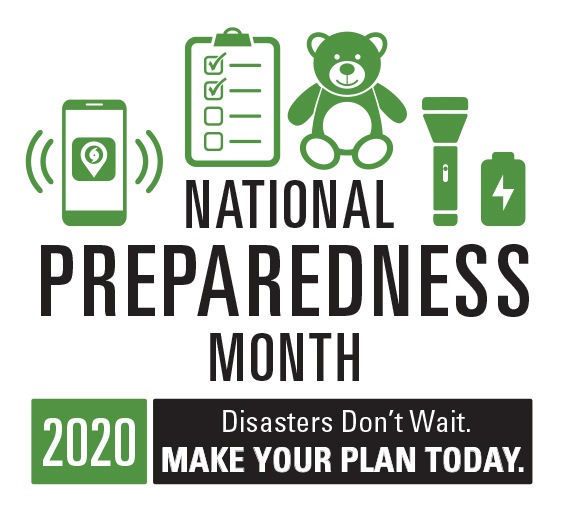Each September, National Preparedness Month reminds us how important it is to prepare for disasters. This year, the coronavirus (COVID-19) pandemic puts into perspective just how unpredictable disasters are and how far-reaching their impact can be.
“Disasters don’t wait. Make your plan today” is a fitting theme for 2020’s National Preparedness Month. The COVID-19 pandemic highlights the need for us to be ready for the impact disasters of all types can have on our lives. Our nation must be ready for disasters on a national, community and family level.
For four-weeks, National Preparedness Month is highlighting easy-to-follow steps that your family can take to improve preparedness at home.
This year's weekly themes include:
Week 1 September 1-5: Make A Plan: Talk to your friends and family about how you will communicate before, during and after a disaster. Make sure to update your plan based on the Centers for Disease Control and Prevention (CDC) recommendations due to the coronavirus.
Week 2 September 6-12: Build A Kit: Gather supplies that will last for several days after a disaster for everyone living in your home. Don’t forget to consider the unique needs each member of your household (including your pets) may have in case you have to evacuate quickly. Update your kits and supplies based on recommendations by the CDC.
Week 3 September 13-19: Prepare for Disasters: Limit the impacts that disasters have on you and your family. Know the risk of disasters in your area and check your insurance coverage. Learn how to make your home stronger in the face of storms and other common hazards and act fast if you receive a local warning or alert.
Week 4 September 20-26: Teach Youth About Preparedness: Talk to your kids about preparing for emergencies and what to do in case you are separated. Reassure them that they have a role to play in being ready for disaster by providing information about how they can get involved.
Everyone has a role to play to ensure that their community is ready for disasters. For more resources, visit Ready.gov.



